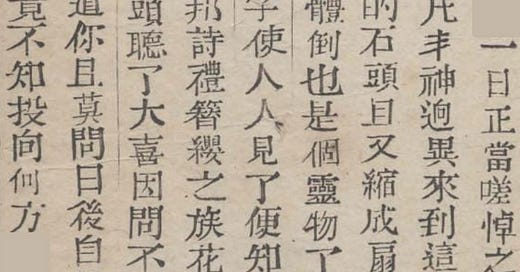The Monk And The Priest
We follow the path of the useless stone that was carelessly discarded. In this passage, the stone encounters a Buddhist monk and a Taoist priest, who foreshadow the entire book.
Chinese Text
一日,正當嗟悼之際,俄見一僧一道,遠遠而來,生得骨格不凡,丰神迥異。來到這青埂峰下,席地坐談,見著這塊鮮瑩明潔的石頭,且又縮成扇墜一般,甚屬可愛。那僧託於掌上,笑道:「形體倒也是個靈物了,只是沒有實在的好處;須得再鐫上幾個字,使人人見了,便知你是件奇物,然後攜你到那昌明隆盛之邦、詩禮簪纓之族、花柳繁華之地、溫柔富貴之鄉那裡去走一遭。」石頭聽了大喜,因問:「不知可鐫何字?攜到何方?望乞明示。」那僧笑道:「你且莫問,日後自然明白。」說畢,便袖了,同那道人飄然而去,竟不知投向何方。
Translation Notes
嗟悼 means 嗟傷哀悼. This is a combination of “sighing” and “morning,” meaning “deep sorrow.” For example, take this sentence from the 文選 (Selections of Refined Literature): 聖王嗟悼,寵贈衾襚, or “the sage king lamented with deep sorrow, bestowing a shroud and garments as a posthumous honor [to the deceased].”
靈物 means “supernatural being.” Here it literally says “Although you indeed look like a supernatural object,” though I’ve simplified this a bit in my translation.
昌明隆盛之邦、詩禮簪纓之族、花柳繁華之地、溫柔富貴之鄉 is the first example of a purely poetic description that we’ve seen. It literally means:
Keep reading with a 7-day free trial
Subscribe to Dream of the Red Chamber to keep reading this post and get 7 days of free access to the full post archives.





